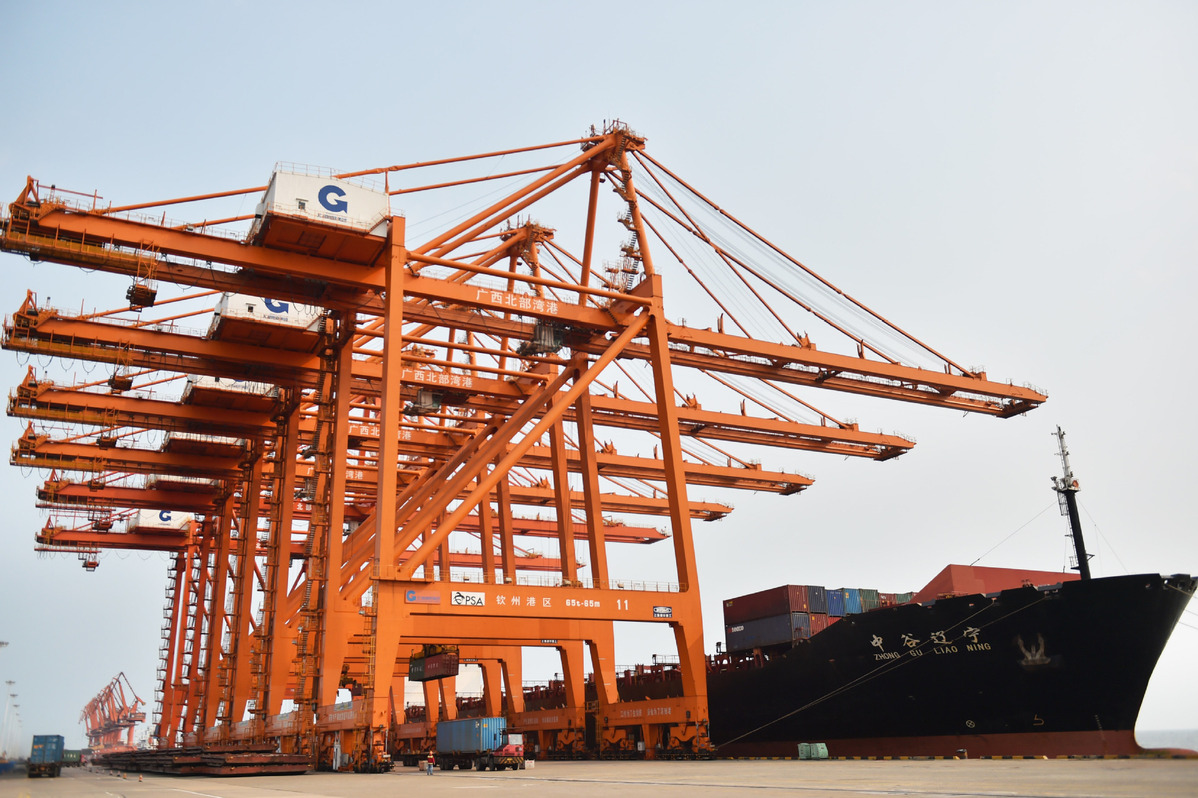Feb 07, 2025, 13:54

A cargo ship docks at Qinzhou Port in China-ASEAN Free Trade Area in Qinzhou, Guangxi Zhuang autonomous region. [Photo/Xinhua]
Global Times-The US trade deficit significantly expanded in December, as imports reached an all-time high amid looming tariff threats. As reported by Reuters, this surge in imports may have been driven by businesses rushing to purchase foreign-made goods, such as finished metals and computers, due to the tariffs. This situation highlights the potential ineffectiveness of tariffs in resolving the US trade deficit and suggests they could even lead to unintended consequences.
Data released on Wednesday by the US Census Bureau and the US Bureau of Economic Analysis showed that the country's total trade deficit in goods and services, which consists of exports minus imports, was $918.4 billion in 2024, a 17 percent increase from 2023.
This data has garnered attention not only due to the rapid growth of the trade deficit but also because of an underlying factor: tariffs. While US President Donald Trump sought to connect tariffs to issues such as fentanyl and illegal immigration, an article published on Wednesday in the New York Times suggested that the trade deficit could end up being a key reason Trump decides to impose tariffs on Europe, China, Canada, Mexico and other governments.
Therefore, can tariffs help the US address its trade deficit? To answer this question, there are several key facts worth considering:
First, there is a famous saying in China: Practice is the sole criterion for testing truth. According to a report by the BBC, in 2016, just before Trump took office, the total goods and services deficit in the US was $480 billion, around 2.5 percent of US GDP. By 2020, it had grown to $653 billion, around 3 percent of GDP, despite Trump's tariffs. It is evident that during this period, tariffs failed to resolve the trade deficit issue, and the deficit problem became even more severe.
Second, in December 2024, following Trump's victory in the presidential election and his threats of tariffs, the US trade deficit did not decrease but instead surged. The goods and services deficit was $98.4 billion in December, up 24.7 percent from November. Reuters, citing Thomas Ryan, North America economist at Capital Economics, said "the strength of imports appears largely driven by businesses rushing orders ahead of potential tariffs." This reflects a strong and resilient demand for imports in the US. If this resilience is sufficiently robust, tariffs may not significantly reduce US imports; instead, businesses might respond to tariffs in other ways, such as passing them on to US consumers.
Third, the US trade deficit is driven by a range of deep-rooted economic factors, such as its economic structure - characterized by its reliance on consumption, coupled with its industrial hollowing-out, which results in insufficient exports.
Tariffs are unlikely to address these fundamental economic challenges or enhance the US economic structure; consequently, it is improbable that they will resolve the resulting trade deficit. Analyzing the manufacturing purchasing managers' index, US manufacturing has frequently remained in contraction territory over the past year, indicating that the issue of industrial hollowing-out continues to be a persistent challenge.
Fourth, some economic studies have already focused on the correlation between tariffs and the trade deficit. Some economists contend that tariffs would have little effect on the trade deficit, because they would be offset by changes in the value of the currency and interest rates, according to the New York Times.
Tariffs have never been an effective solution to trade issues, including the trade deficit; instead, they only harm both parties involved in trade, resulting in a lose-lose situation. Chinese Foreign Ministry spokesperson Mao Ning has said that China always believes that there is no winner in a trade war or tariff war, and remains steadfast in safeguarding its national interests, the Xinhua News Agency reported.
Chinese officials have stated on various occasions that China has never deliberately pursued a trade surplus. In recent years, China has implemented a series of measures to expand market openness and encourage imports.
For the US, a viable solution to address its trade deficit is not through tariffs; rather, it lies in adopting a more open attitude toward international trade, particularly regarding the export of its high-tech products, which represent a competitive advantage for the US. Continuously expanding this export advantage and increasing exports would be a beneficial approach to reducing the trade deficit.
Community login







Add a comment